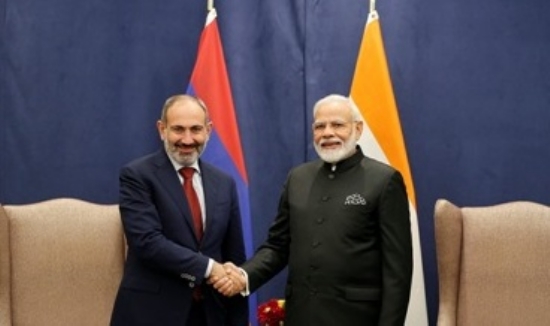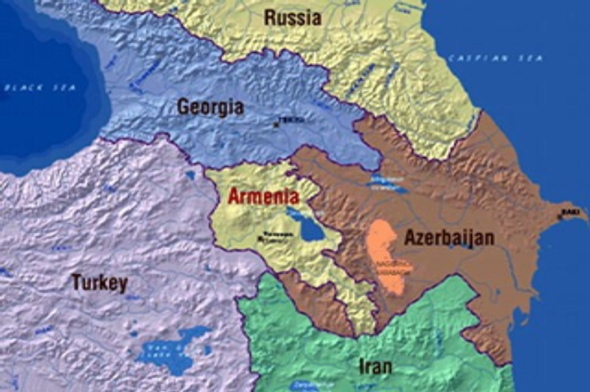Behind the Scenes: India-Armenia Weapons deal
| Date: 19-Mar-2020 |

The $ 40 million India-Armenia weapons deal caught the attention of the global fraternity, where India emerged as a winner competing Russia and Polish counterparts and initiated a new era for the Indian defence industry. What initially looked like a random ripple in the global arms race is quickly turning out to be a well-calculated strategic act by both the Nations. In the Pre Indo-Armenian weapons deal era, Russia remained the sole provisioner of its strategic needs. However, by this bold and decisive move, Armenia has re-written its rules for foreign policy and has unlocked its doors to new possibilities.
Two enemy states flank the Armenian Republic, with Turkey in one side and Azerbaijan on the other, posing a constant threat to their sovereignty. The Genocide of Armenians by the Islamic empire of Ottomans, the predecessors of the modern Turkish state, is one of the most horrific chapters on crime against humanity of the 20th Century. About 1.5 million people of Armenian ethnicity and around 4.5 lakh people of Greek and 3 lakh of Assyrian ethnicity were wiped out in a manner that equals the horrors of the Holocaust.
The Racial cleansing of Armenian Christians and other minorities in the Islamic empire of the Ottomans must have served as a precedent for Nazi's, who later plotted not if similar, a somewhat more brutal repetition of the Armenian Genocide. The Genocide was allegedly engineered by a radical group that came to be known as the 'Young Turks'. In contemporary times the term 'Young Turk' is used liberally and has been normalised by the extensive use of propaganda literature. A popular Left-wing news and opinion show by the name of 'The Young Turks' is very popular among the left-wingers and attracts a large viewership in the western world. The fact that a self-proclaimed Left-Wing channel exists by this name is itself a dishonour to the victims of the Armenian Genocide and is equal to having a news and opinions show named "The Nazi".
Apart from historical animosity practised the Turkish state, its other neighbour, the Republic of Azerbaijan also hosts a significant bone of contention against Armenia and is actively engaged in a state-sponsored aggression to control the Nagorno-Karabakh region mostly populated by the Armenians.
It is important here to note that Russia and Armenia enjoys an exclusive bilateral partnership under the Collective Security Treaty Organization (CSTO) framework. Yet, after being economically crippled by U.S sanctions, Russia has overlooked its exclusive foreign policy with Armenia and sold weapons worth $4 Billion over the years to Azeris(The Armenian Weekly, 5th March 2015). It has significantly hampered the strategic abilities of the Armenians and possibly also of the Russians themselves, as Azerbaijan is the all-weather ally of Turkey, and Russian-Turkey relations have a tense history of Diplomacy.

Image Source: Eurasia Daily
Concomitantly, Turkey and Azerbaijan constitute a notable lobby that actively seeks an Anti-Armenian policy and maintains a strategic partnership with the Islamic Republic of Pakistan. This Triad actively pursues an Anti-India and radical Islamist agenda, followed by a common trait of hatred and state-sponsored Genocide against Religious and Racial minorities in their respective countries.
While, the Turkish state killed millions of Armenians, Greeks and Assyrians, the Islamic state of Pakistan induced a genocide against its Hindu, Sikh, Buddhist, Parsis and Christain citizens. The commonality of hatred against its Non-Islamic populace perhaps further adds to the bonhomie-hood of this Triad. Moreover, a member of the National Assembly of Azerbaijan, Tahir Rzayev, had allegedly stated that 'Azerbaijan has Pakistan' when reporters sought his reaction on the Indo-Armenian weapons deal. Even before the weapons deal came into the picture, Azerbaijan had clearly expressed their intentions for New Delhi by taking part in a Military parade in Pakistan, and by buying their outdated military hardware over the decades. Furthermore, the Islamic Republic of Pakistan is perhaps the only country in this globe that doesn't recognise Armenia as a country and disputes its sovereign existence.
Armenia and India, on the other hand, enjoy a brief history of Shared legacy that dates backs to 149 BC. Pieces of literary evidence were found that asserted the legend of two Indian princes, probably from the Kannuj area migrating to Armenia with a large entourage, and later settled in the Taronregion of present-day Turkey, by Armenian King. Similarly, Thomas Cana is accepted as the first-ever Armenian to reach the Malabar coast of India in 780 AD and subsequently houses a notable population of Armenians in India.
Consequently, with the advent of Sattelite television, Indian telefilms and family drama have become a massive hit along with the Bollywood in Armenia and have perfectly complimented the policy of Soft-power Diplomacy of India. However, India needs to invest more in developing this already present affinity of Armenians towards Indians and needs to plan a proper framework agreement with Armenia and other friendly nations in the region. The Weapons deal has introduced new dynamics into the otherwise stagnant Geopolitics of the world with promising new possibilities and a ray of hope for smaller nations often bullied by traditional superpowers.
